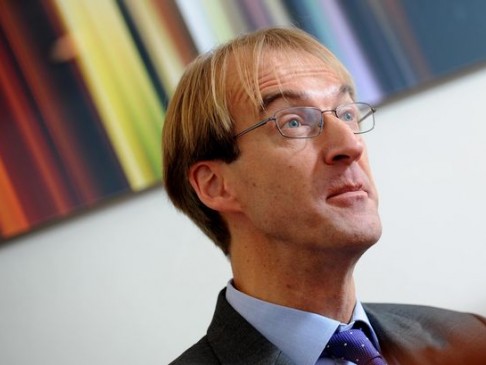Forget all the doom and gloom the global economy is in good shape says leading economist Kevin Gardiner

While another financial crisis is inevitable the long-term prospects for the global economy are far brighter than the doom and gloom picture painted by many commentators, believes leading economist Kevin Gardiner. Speaking in a personal capacity to a meeting of Cardiff Breakfast Club, the global investment strategist for the wealth management division of Rothschild said the world has never been in a better place in terms of the average wealth of its population. And speaking after his address, Cardiff-born Mr Gardiner, a former pupil of Glan Ely High School and Atlantic College, said there was no reason why South Wales couldn’t attract front office financial and professional services functions, particularly around financial innovation, from the city of London and elsewhere. Mr Gardiner said it was important to differentiate between short-term concerns, like whether China’s slowdown might turn into something more troubling or whether the current US economic slowdown will fuel another US recession, and the longer-term picture which pointed to continued growth in global prosperity. Mr Gardiner said: “It is important to keep in mind though that at end of the day economies are driven by underlying things like spare capacity, education, labour and technological process. “And the economy most of the time grows and the global economy is already larger than it was before the financial crisis. “And whenever the next crisis does hit, it is important to remember that we will muddle through it somehow. “But if you focus too much on the short-term doom and gloom you may miss long-term investment hiring and business opportunities.” And he believes many of the fears that people have, like around debt levels, demographic pressures, deflation and depletion of scarce resources, were overstated. Mr Gardiner said: “If you take debt then for every borrower there is a lender and it does all net off. And in most of the analysis of debt, when applied to larger economies, people tend to forget that. “They tend to think, for example, that the US consumer is horribly indebted and the reality is that the average US consumer is one of the wealthiest people on the planet. And even in the international borrowings of the US as a whole, set against the size of the US economy, it is effectively inconsequential. “That doesn’t mean it doesn’t trouble the markets from time to time, but they are not life threatening as people often suggest.” Mr Gardiner said when people talk of a desire to re-balance the UK economy back towards manufacturing, he said it was a case of being careful what you wish for, and that manufacturing in the UK, while still world class, was relatively smaller than it has been in the past for a reason. He said: “In manufacturing we make the mistake of saying we just don’t make things in the UK. Firstly that is not the case as we have world class manufacturing companies, some of them are British and some overseas owned. “And UK manufacturing is as profitable and more efficient as it ever has been and the motor industry is a classic case in point, where we export most of the cars that we make because they are pretty competitive and much more so than in the 1970s. “So we do make things, but as a proportion of the economy manufacturing does get smaller as the rest of the economy grows much faster. “That is something not necessarily to be worried about but, as in all big economies, as people become wealthier they spend more of their disposable income on intangible things, as their tangible needs have been met. “So whether processed foods, cars, refrigerators, for all these things there is only so much that you can consume. And as people get wealthier they tend to spend more money on things like entertainment, travel, leisure, education and even financial services. “These things take a bigger proportion of spending, so to rebalance the economy in favour of manufacturing would almost require that we go back to previous levels of prosperity we were at when manufacturing was a bigger proportion of the economy. “So it is not nature for the economy to go back to being manufacturing led, but that doesn’t mean that we don’t have some world class manufacturing companies.” When the next financial crisis hits, he said the way that the markets and media interact would ensure a mindset in the general public “that we are doomed once again and we will never recover”. He added: “But we probably will recover and have bounced back in the past. Sometimes central banks and governments can help out, but often the economy itself tends to be pretty resilient as finance doesn’t drive the real economy, but in the long-term sense the real economy drives finance. “So as long as business has room to innovate and workers get better at what they do, which they do steadily all the time, and we have spare labour, then all these things are where growth comes from.” Mr Gardiner, a member of the Welsh Government’s external advisory panel for financial and professional services, believes Cardiff and the wider city region can attract front office functions from London. He added: “One of the more encouraging things that we have seen recently is a very strong consultancy and legal sector in Cardiff. There is no reason why that shouldn’t get larger and provide legal and other services to the rest of the UK. “One of the areas we have been looking at is financial technology and the way things are changing in terms of payment processes. And there isn’t any reason why a lot of that couldn’t be done in Cardiff.” He said that in attracting inward investment, South Wales was well placed due to the quality of life, lower costs, and good communications. But he said there was a “missing ingredient,” in how Wales markets itself as an inward investment location. Mr Gardiner said: “If I had one suggestion then perhaps Wales doesn’t always speak with a single voice when it comes to getting inward investment. One of the things that the Irish government did, and they were tremendously successful at, and yes tax rates made a big difference too, was they spoke with one voice to make sure that everything was focused on attracting inward investment. “And they have front office capabilities and in their case a lot of manufacturing too, which is really high valued added. So it isn’t just back office stuff.” He said that if Wales has powers over business taxation – although business rates are now devolved – including a degree of flexibility over corporate tax, it would make the case stronger for attracting investment. He added: “If you are a quoted company and you are looking to open a new operation somewhere, or looking to relocate an existing operation, you have got to be able to demonstrate something objectively to your shareholders. So anything that you can quantify and point to as an objective difference will tend to help. I think Cardiff is a fantastic place to live, but that is not enough in itself. So if you can point to a lower effective tax rate, lower real estate and employment costs, you can say to shareholders ‘here are some objective reasons for making a move’.” Cardiff Breakfast Club, held at the SSE Swalec Stadium, is sponsored by Blake Morgan, the Western Mail, Lloyds Banking Group, the economic development team of Cardiff council and Stills Branding.

